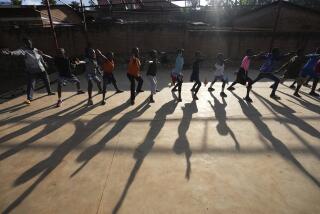Belgium Apologizes for Failure to Stop Massacre
KIGALI, Rwanda — Belgian Prime Minister Guy Verhofstadt apologized Friday for his country’s failures during Rwanda’s 1994 genocide, in which more than 800,000 people were slaughtered.
“In order for Rwanda to turn its eyes toward the future, toward reconciliation, we have first to assume our responsibilities and acknowledge our mistakes,” Verhofstadt said during a ceremony to mark the sixth anniversary of one of the most intense and organized mass killings of the last century.
“In the name of my country, I pay tribute to the genocide victims, and in the name of my country, my people, I beg forgiveness.”
Verhofstadt and other dignitaries laid flowers at a new memorial site in the capital.
Belgium, Rwanda’s colonial ruler until 1962, supplied the bulk of a U.N. force deployed in 1993 to stand between Tutsi-led rebels and Rwanda’s then-government of Hutu extremists. But the U.N. force pulled out after Rwandan soldiers disarmed, tortured and killed 10 Belgian peacekeepers.
That attack came on April 7, 1994, the day after the mysterious downing of a plane carrying Juvenal Habyarimana, Rwanda’s Hutu president. News of the president’s death enraged Hutu soldiers and militiamen, who hunted down hundreds of thousands of Tutsi men, women and children and killed them on the spot.
More to Read
Sign up for Essential California
The most important California stories and recommendations in your inbox every morning.
You may occasionally receive promotional content from the Los Angeles Times.










